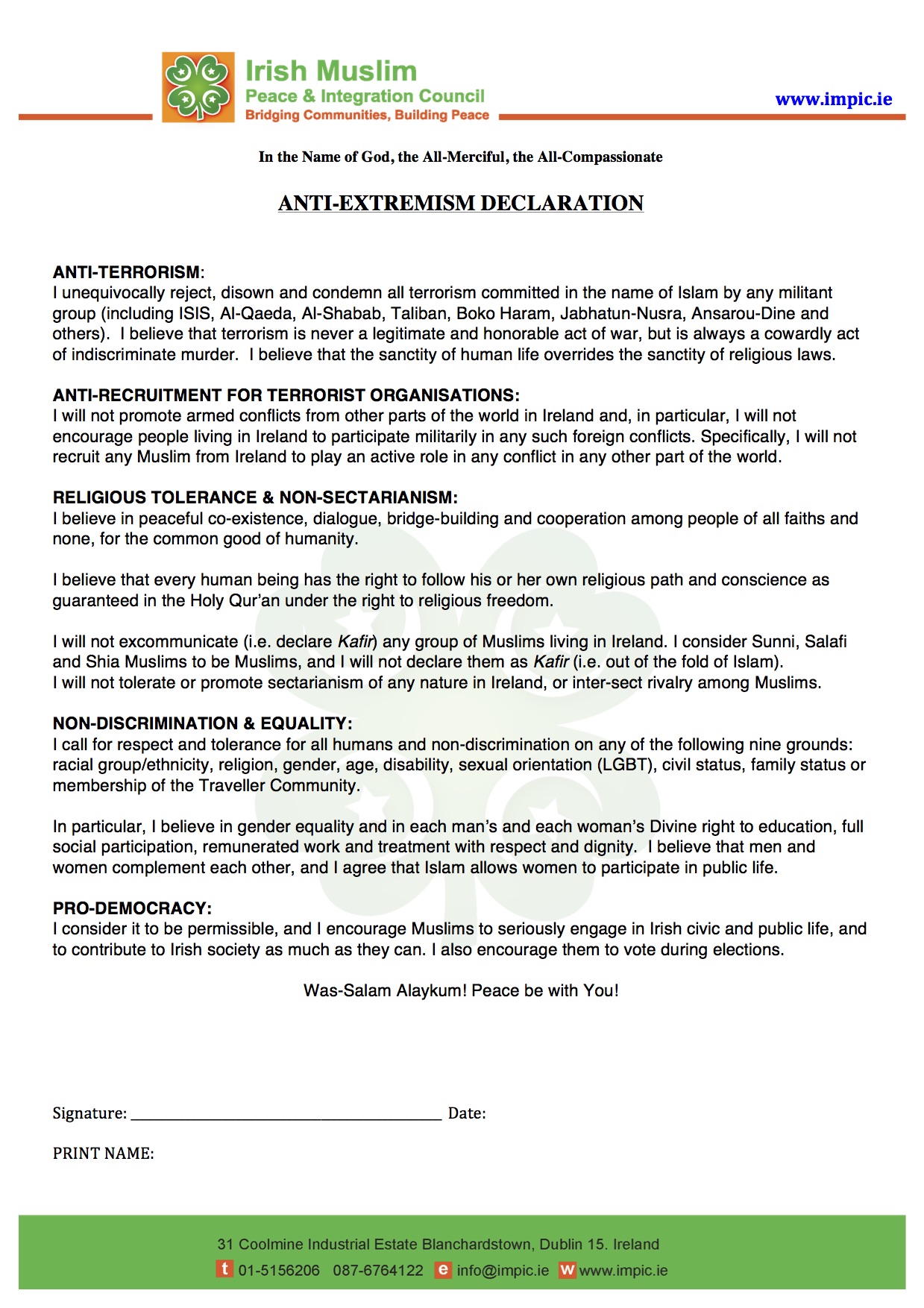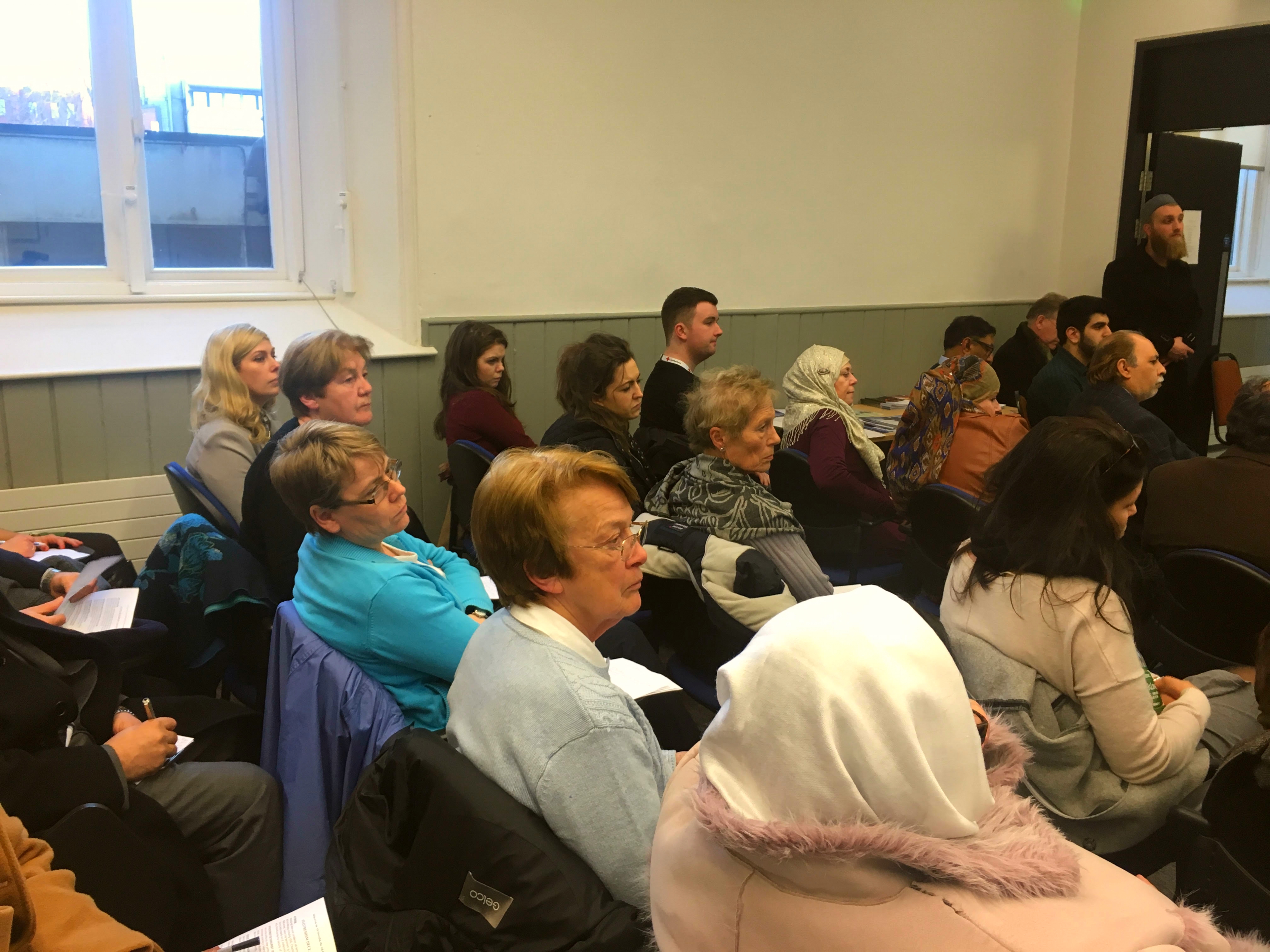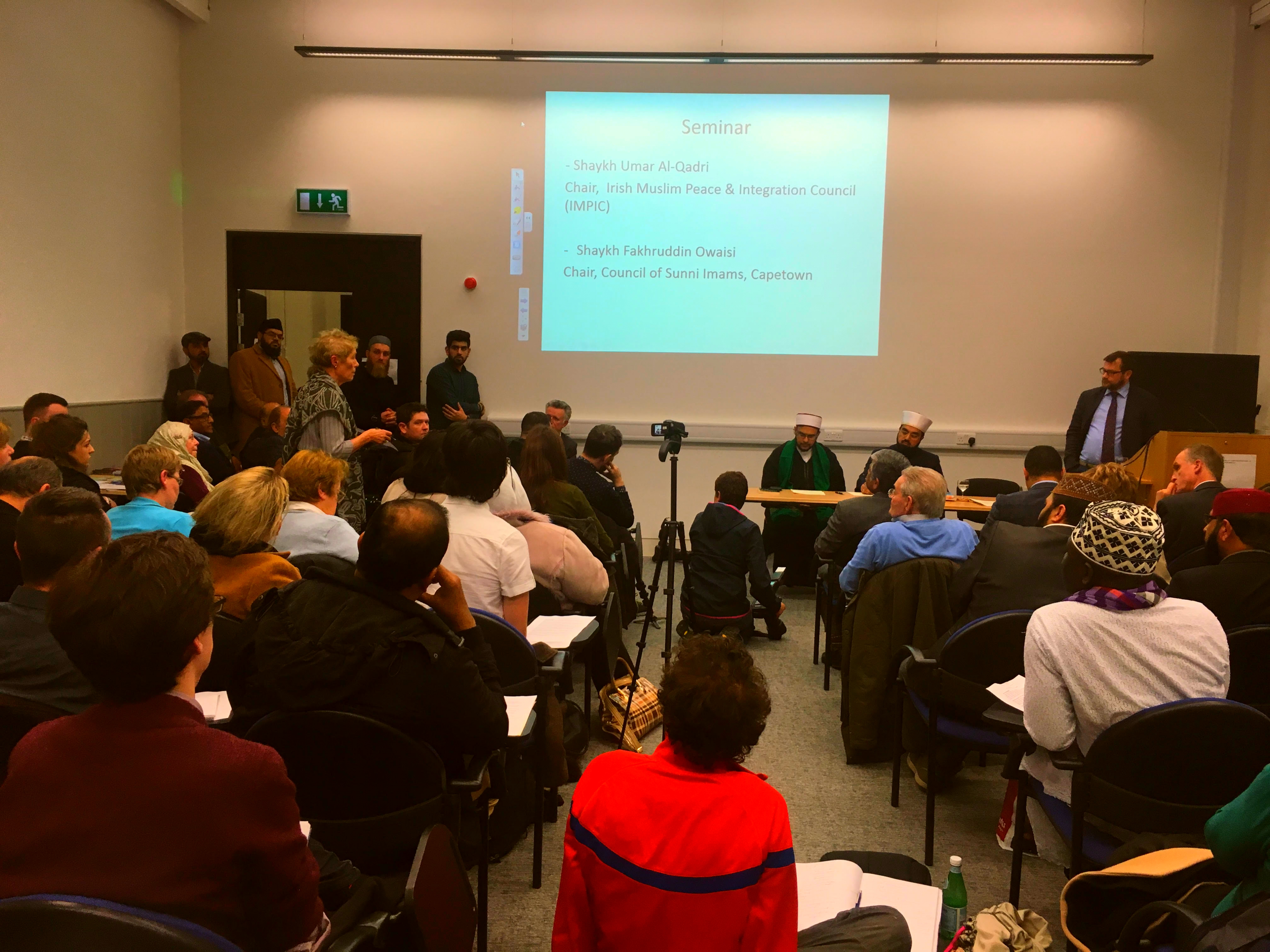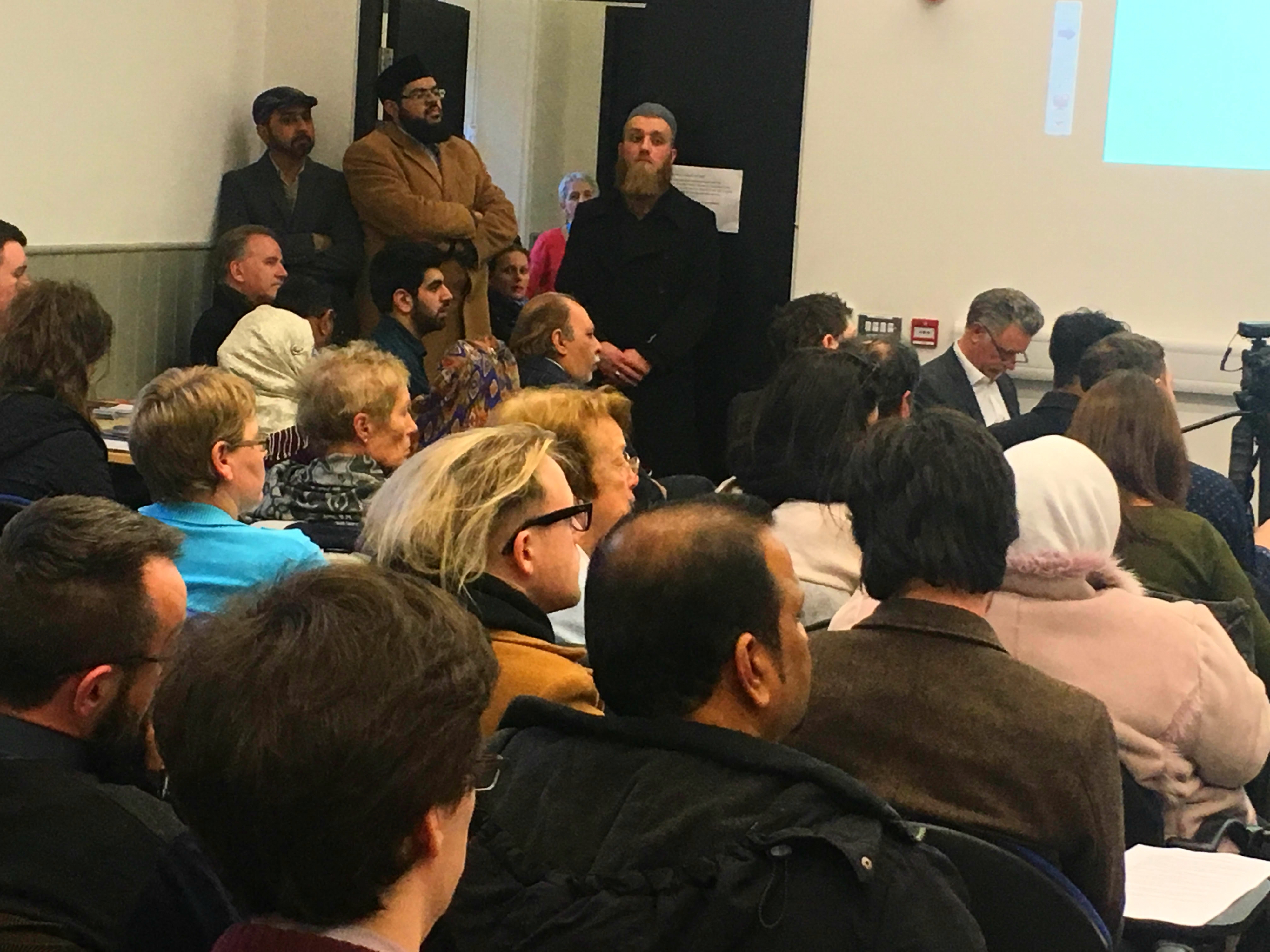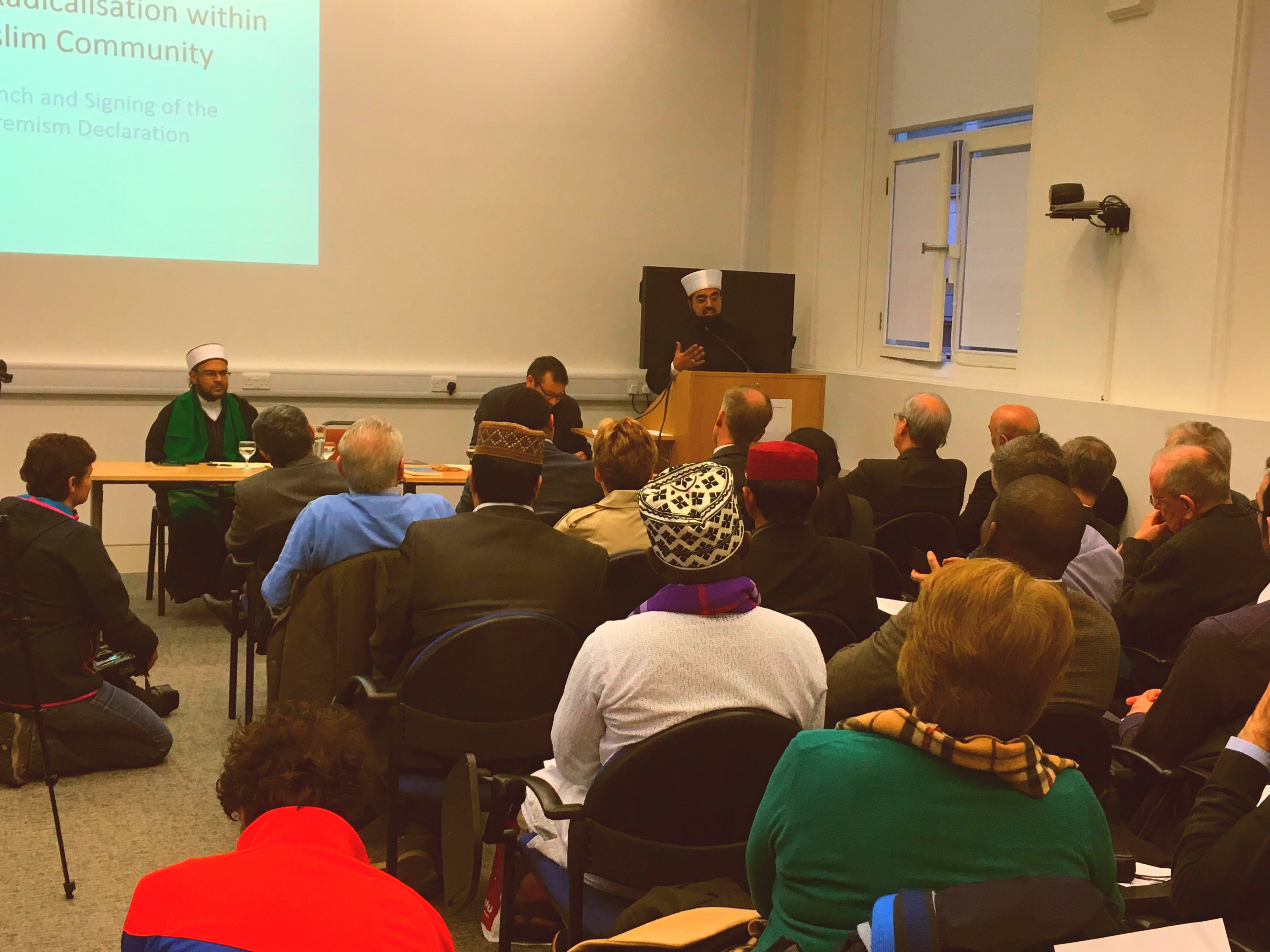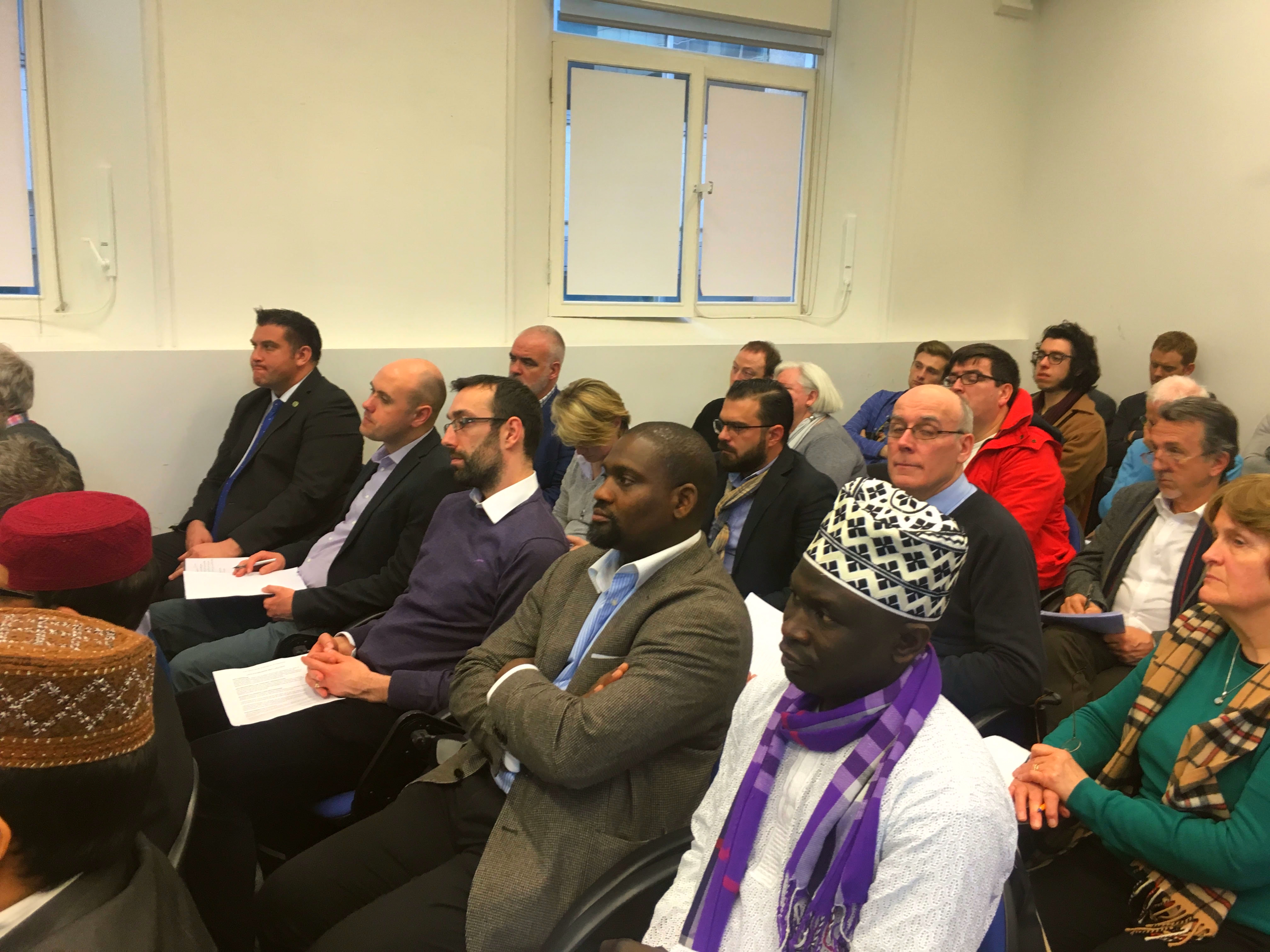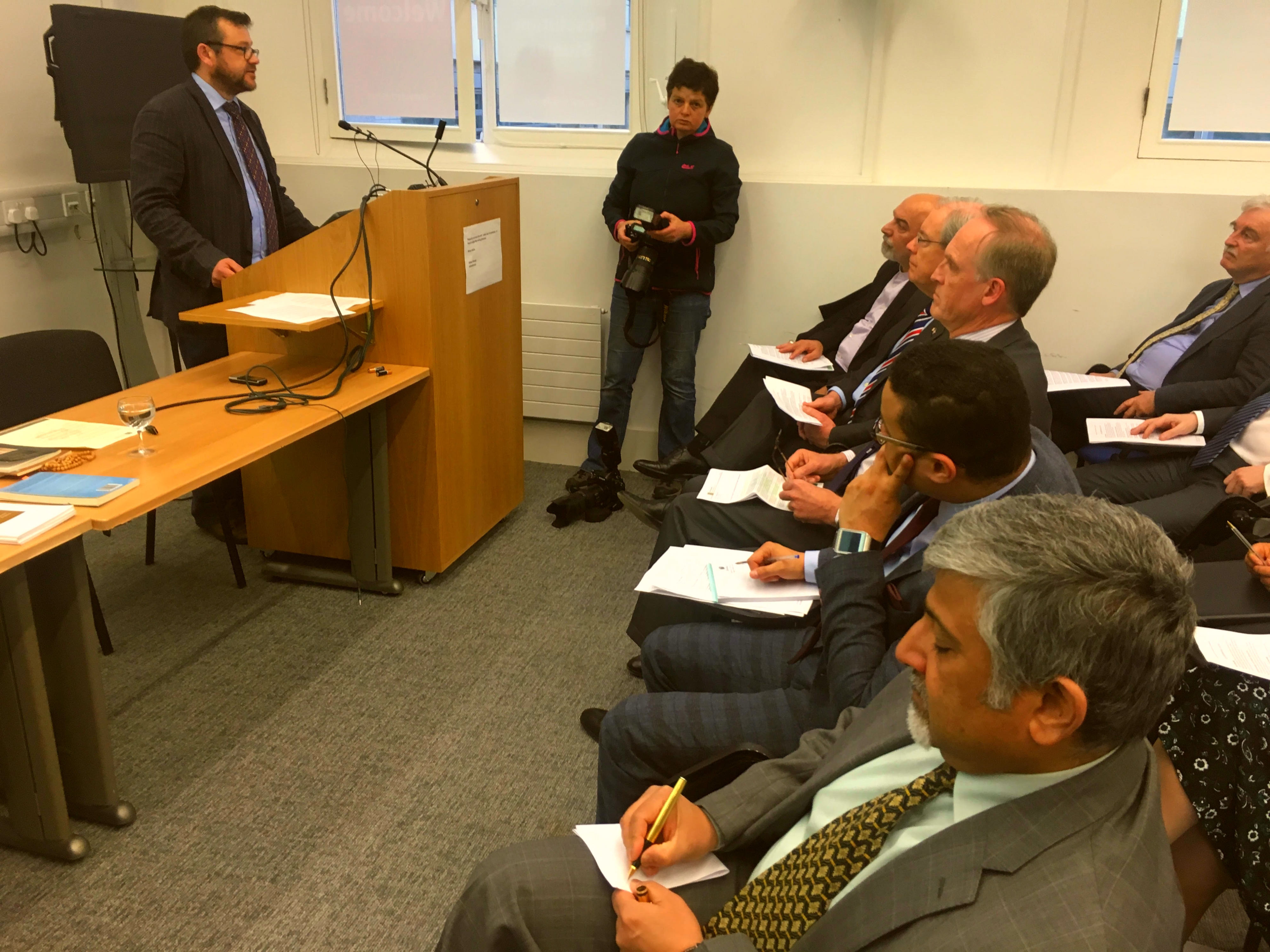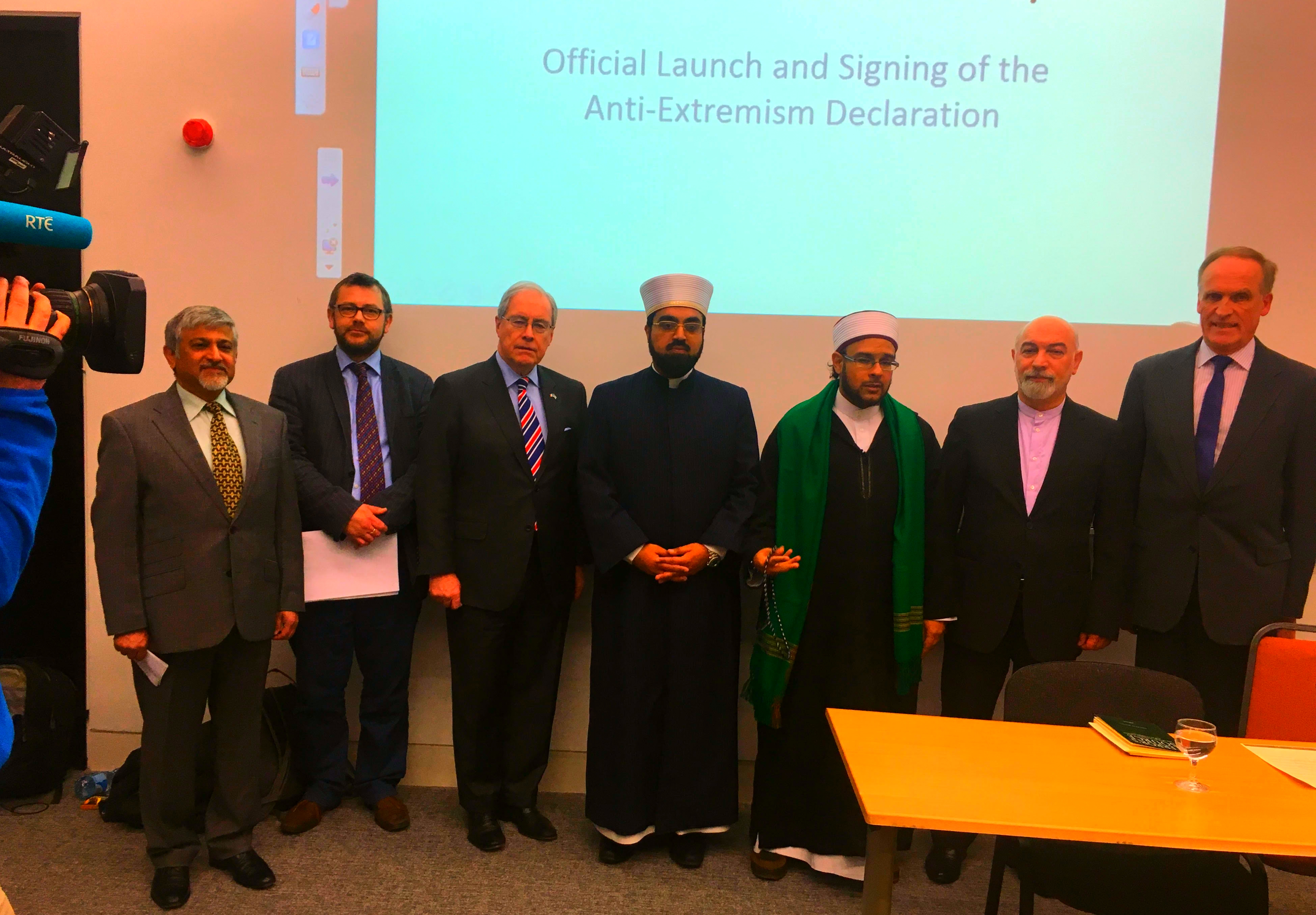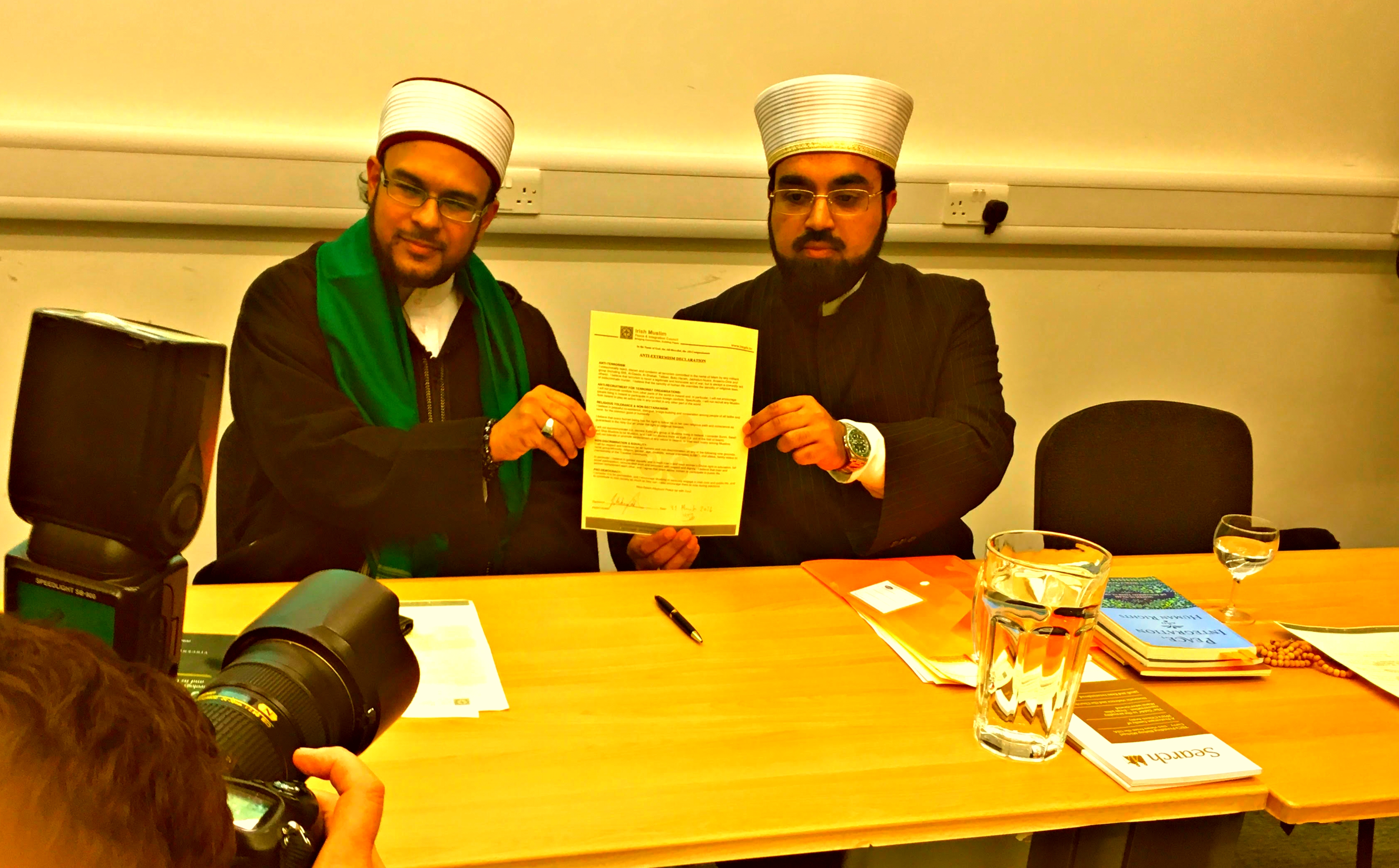On Thursday 31 March 2016 the Irish Muslim Peace & Integration Council launched an anti-extremism Declaration in a seminar held in Trinity College Dublin. The seminar entitled: Preventing Radicalisation within the Muslim Community was attended by many distinguished guests including H.E. Mr Philippe Ronald Ambassador of Belgium; H.E. Mr Kevin O’Malley, Ambassador of USA; H.E. Mr Javad Kachoueian, Ambassador of Iran and H.E. Dr. Syed Rizwan, Ambassador of Pakistan. The French, Turkish and Egyptian were also represented.
The seminar was chaired by Dr. Andrew Pierce, Assistant Professor in Intercultural Theology and Interreligious Studies, from the Irish School of Ecumenics, who invited all those present to observe a minute’s silence to honour those who had lost the lives or been injured in terror attacks by extremists throughout the world. Dr. Pierce pointed out that the term “radicalisation” was really a misnomer in regards to the current situation, as it literally meant “a return to the roots, to the authentic origins”. The vision of today’s radicalisation was only very superficially attached to the deep roots of Islam.
Dr. Pierce before inviting Shaykh Umar Al-Qadri to speak, said that tonight’s seminar provided us with an opportunity to hear two important scholars discuss the challenges posed in contemporary Islam by those who seek to radicalize Muslims (often young male Muslims). ‘
He pointed out that the seminar was making history as it was introducing an anti-Extremism Declaration. The Declaration was an initiative undertaken within the Irish Muslim community, produced as part of its own internal dialogue with a view to protecting itself and its members from those whose understanding of Islam was highly selective and highly predatory. Islam was rightly celebrated for its internal diversity, and for its multiple institutions of authority. These gifts remained unchallenged by the Declaration. What the Declaration was challenging was any attempt to subvert the identity of Islam, and to make it serve lesser ends.
Shaykh Umar Al-Qadri, in his speech, said that there are many factors that contribute to the rise of extremist groups and he believes the only hope of defeating them is to address all these factors honestly. He said that the first factor was politics. European and US foreign policy in the Middle East undoubtedly contributed to rise of Daesh. Daesh emerged from the insurgency against the US occupation of Iraq, just as the Al Qaeda network traces its origins to the Afghan resistance to the Soviet occupation in the 1980s. Shaykh Al-Qadri referred to a study by Robert Pape, founder of the Chicago Project on Security and Terrorism, who studied every suicide attack in the world since 1980, evaluating over 4,600 in all. The research argued 95% of attacks had a political motive. Shaykh Al-Qadri said that politicians and policy makers have a responsibility to address the genuine grievances that contribute to people joining such militant organisations.
Shaykh Al-Qadri then spoke of the second factor that contributes to Islamist extremism; the social factor. He referred to a research conducted for the journal Social Behavioral Science & Policy after the Paris attacks in November, in which hundreds of Muslims in Germany and the US were asked about their experiences as religious and cultural minorities. The research concluded that marginalisation contributes significantly to the radicalisation of young European Muslims and encourages them to join organisations such as Daesh.
The third factor contributing to Islamist extremism, was theology. He stated that while misinterpretation of theology in most cases was not the motive behind terrorist attacks, it did serve as a tool for recruitment and a potent means of getting people to overcome their fear of death. The overwhelming majority of Muslims (1.6 billion) do not understand their own religion in the same way as this extremist minority. Extremist groups such as Daesh had abandoned the 1400-year-old Islamic tradition of relying upon Muslim scholars and jurists for advice and guidance in relation to matters of religion and politics.
The Shaykh said that while extremism and radicalisation is not a major issue at this state and the Muslim Community in Ireland is a very well integrated community, but we are certainly not immune to extremism and radicalism. He said that he is witnessing seeds of extremism being spread and practical steps must be taken to stop the spread of extremism. He said that many speakers with extremist views have visited Ireland in the past, sometimes at the invitation of Mosques, Charities and sometimes at the invitation of student debating societies .
Such speakers can be invited because of their radical views for the purposes of engaging in a robust debate within a university setting. However, sometimes these speakers can be given a national platform by being interviewed on major TV programmes. Media researchers too need to be aware of the views of those invited to speak on behalf of Islam. One way to ensure that such distorted views, that are not compatible with our society and unhealthy for our community, can be challenged is to ask foreign Muslim speakers to sign the anti-extremism Declaration. Those who preach extremism and terrorism make use of the freedom of speech tradition in Western countries, whilst not allowing any freedom of speech at all in their home countries.
Finally the Shaykh emphasised that the articles of the Declaration in no way contradicted Islamic law, or the Irish Constitution. They were in fact, a re-statement of existing European and Irish law in areas relating to equality, non-discrimination and the enjoyment of full human and civil rights by all citizens. It was important to note that this initiative had come from within the Irish Muslim Community. He suggested that the Government might consider incorporating some key concepts of the anti-extremism Declaration as part of the visa process for visiting speakers to Ireland.
South African cleric Shaykh Fakhruddin Owaisi al-Madani (Chair Sunni Ulema Council Capetown, South Africa) said in his speech that extremism was the first step to violence and was often driven by foreign speakers. This had happened in South Africa and, he feared, was at risk of happening here.
Shaykh Owaisi said the Muslim community was very well integrated in South African society, with members present at the highest levels of politics, the courts, and sport. However, he said that, in the last few years, that has changed and some extremist elements have come from elsewhere. In particular, quite a few preachers had come from London and the Middle East. This had resulted in Muslims youths joining Daesh (ISIS) some of whom have since come back. That was a wake-up call for us, he said, adding: Do not think your Irish society is immune”
Shaykh Owaisi said the State needed to stop radical and extremist speakers coming to the country now. “We need prevention, it is better than cure,” he said.
On the anti-extremism Declaration, he said that it is a Muslim initiative to protect the Muslim community. I hope to see the Irish government respond to this. I don’t want you to respond when it is too late, said Shaykh Owaisi. He said that there were “preachers of hate in Islam” who targeted non-Muslims and Muslims alike.“They are a common enemy,” he said, adding that the first step to violence was extremism.
“You can’t say we don’t want the violence but not do anything about extremism.” The anti-extremism declaration was then signed by Shaykh Owaisi
A Question and Answer session followed, during which it was pointed out the Declaration would be sent to mosques and student Islamic societies throughout Ireland. A problem highlighted was that the media could sometimes unwittingly give a national platform to foreign extremist speakers who had been invited to speak by university debating societies. It was therefore important that the media were aware of the Declaration also. Dr. Al-Qadri pointed out that the response of visiting speakers when they were asked to sign the Declaration could help to clarify their intentions regarding the content of their teaching.
The Irish Peace and Integration Council welcomes feedback from both Muslims and the general public to info@impic.ie as we believe the document is still “work in progress” and further recommendations are welcome.
Please download PDF Document of Anti-Extremism Declaration here: Anti-Extremism Statement
PRESS COVERAGE IN MEDIA :
http://www.independent.ie/irish-news/news/preachers-of-hate-grooming-students-34593823.html
http://www.rte.ie/news/2016/0331/778719-declaration/
http://campus.ie/surviving-college/preachers-hate-grooming-students
RTE 9PM News 31st March 2016 (Night of the Launch of the Declaration)


